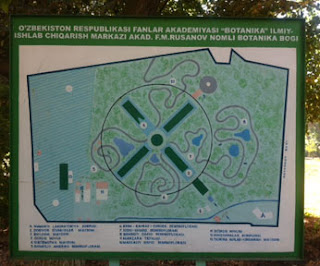 |
| Botanist Ada Alexandrovna |
History & Design of the Tashkent Botanical Gardens
Dating back to the 1920s, it is the oldest and largest botanical garden in Central Asia. The construction of the garden at its present site began in 1950 under the visionary leadership of the academician Dr. Fedor Rusanov. He was the Director until his retirement in 1975. Today it continues to be managed by the Uzbek Academy of Science's Botanical Institute.
The garden is divided into zones corresponding to different geographic regions: Central Asia, Crimea and the Caucasus, Europe, the Far East and East Asia, and North America. This collection, covering around 40 hectares, includes more than 4,500 species and varieties of trees, shrubs, dwarf shrubs, vines, grasses and aquatic plants.
In addition to the open-air zones there are greenhouses and hothouses of over 800 varieties of tropical and subtropical plants. There is also a special nursery for medicinal herbs. Researching Central Asian medicinal plants, most of which have not been properly evaluated, is an area of particular interest to the scientists at the Botanical Institute.
 |
| Tashkent Botanical Gardens overview |
In 1025, Avicenna published The Canon of Medicine, in which he described the herbs that were most widely researched and used in medical practice then. Today, many of those plants are still used in medicine in Central Asia.
Visiting with Ada Alexandrovna
Ada Alexandrovna has been associated with these gardens for decades. Trained as botanist, she was a teacher and has also guided at the gardens for a long time. Her deep knowledge and joie de vivre make her very popular with school groups. Her stories transform the space into a magical world. And not just for children.
Meeting at the main gate, Dr. Alexandrovna explained that the magnificent specimens that greet the visitor were transplanted by Dr. Rusanov from the old garden to this site. Many are very old, such as the ancient ginkgo bilobas and junipers.
 |
| An inviting alley way in the gardens |
Since my visit was in autumn, Dr. Alexandrovna's focus was on discovering edible and medicinal berries and nuts. I followed her down winding alley ways of autumn trees, stopping now and then as she pointed out favourites. She had a story or legend about every tree we paused at. Dr. Alexandrovna also vigorously shook the branches when she spied ripe foods. I would never even have known to look for them; soon I had filled my pockets with delicious berries and nuts that could not only assist heart problems and respiratory troubles but were tasty to boot!
The gardens must be beautiful in each season. It is a lovely place, a little out of town. (A taxi ride there takes around 20 minutes and is about 10,000 soum). On weekends it is a popular family picnic spot. Wedding parties enjoy visiting as well, particularly the wishing tree, on which the bride and groom tie ribbons to the branches as they make wishes for their future.
 |
| Ada Alexandrovna's card and my healthy heart berries |
The gardens are open every day, except Monday, from 10:00 a.m - 5:00 p.m. and the entrance fee is 2000 soum. If you would like a guided tour, please telephone the gardens in advance on +998 71 2891060 or +998 71 2890465. If you are not a Russian speaker, you will also need to hire an interpreter for the tour. Uzbek Journeys can arrange all this for you.
Update: Sadly, Ada Alexandrovna passed away in September 2014.
Related posts: 48 Hours in Tashkent
Avicenna of Bukhara and Al-Khorezmi of Khiva